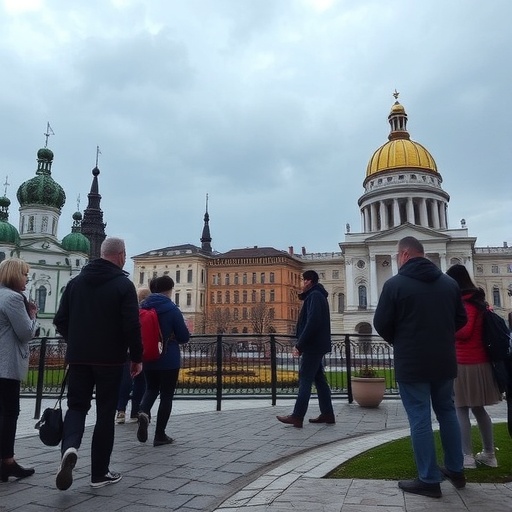Despite the relentless turmoil enveloping Ukraine since the onset of war in February 2022, the nation has demonstrated a remarkable capacity to sustain public services under extraordinary circumstances. Emerging research conducted by Linköping University sheds new light on the mechanisms underpinning this resilience, revealing that a dynamic partnership between citizens and public authorities has been central to maintaining societal functions. This collaboration, born out of necessity, offers transformative lessons for other nations facing conflict or crisis conditions.
At the heart of this adaptive governance model lies an unprecedented degree of cooperation across all strata of Ukrainian society. Mariana Gustafsson, docent in political science at Linköping University’s Department of Management and Engineering, explains that effective crisis management transcends institutional boundaries. “Every individual, from families to civic groups, plays an integral role in decision-making,” she observes. This collective engagement became a force multiplier in confronting the multifaceted challenges of wartime governance, enabling rapid, context-sensitive responses.
The comprehensive study, spanning 2023 and 2024, zeroes in on the Dnipropetrovsk region, collecting empirical data through surveys of 239 public officials and 882 citizens. This extensive quantitative material is complemented by in-depth qualitative interviews with key public figures and active civil society members, cumulatively painting a detailed portrait of societal adaptation amid conflict. The research, published in the peer-reviewed journal Government Information Quarterly, contributes critical empirical insights on governance under duress.
Findings highlight that collaboration, once sporadic and limited, expanded dramatically in both scope and depth. Civil society emerged not just as a beneficiary but as a proactive co-creator of solutions, leveraging localized networks to identify emergent needs swiftly. Such mobilization proved indispensable in dynamically tailoring relief efforts and bolstering public services. Digital innovation paralleled this social dynamism, facilitating agile responses—among them rapidly developed digital tools to assist war veterans or displaced populations.
Instrumental in these developments was the digital government services platform Diia, which had already gained national traction before the conflict. Diia’s architecture enabled seamless integration of civil society functions with official channels, creating a hybrid digital ecosystem for service delivery. Today, more than half of Ukraine’s population engages with Diia via mobile devices, underscoring the critical role of digital infrastructure in sustaining governance continuity amidst disruption.
The linchpin of this resilient governance framework is societal trust — a fragile yet potent commodity. Trust undergirds the belief that actors within the system—individuals, organizations, and public authorities alike—are aligned with the common good and uphold their responsibilities. Although this trust was historically tenuous, particularly given Ukraine’s past struggles with corruption and institutional fragility, it has gradually solidified since the Orange Revolution in the mid-2000s. The war has intensified this dynamic, reinforcing commitments to transparency and cooperation, even as challenges persist.
Trust, however, is not a static resource; it demands deliberate cultivation and renewal. Gustafsson emphasizes that authorities’ flexibility and proactive engagement with civil society are pivotal in nurturing this trust. At the same time, citizens’ own heightened agency—manifested in increased civic participation and active problem-solving—is essential. These reciprocal dynamics foster resilience, enabling societies to better weather crises. This insight resonates broadly, cautioning against complacency in stable democracies where civic engagement has waxed and waned over time.
This social contract forms the substratum for governance that is both adaptive and legitimate. The Ukrainian case exemplifies how decentralized networks and central authorities can synergize to maintain robust service provision even when routine systems are disrupted. The blending of traditional bureaucratic structures with spontaneous civil initiatives challenges conventional assumptions about top-down crisis management, offering a new paradigm where citizens are not mere recipients but active architects of governance.
The researchers are candid about the study’s limitations, acknowledging that wartime conditions constrained the representativeness of survey data and restricted geographic scope to the Dnipropetrovsk region. Nevertheless, the findings provide valuable, generalizable insights into the configurations that enable successful collaborative governance under extreme conditions. The partnership between Linköping University and Dnipro University of Technology reflects an international scholarly commitment to understanding and supporting societal resilience in conflict zones.
At a technical level, this research integrates survey methodology with qualitative depth interviews, leveraging mixed methods to triangulate data and validate emergent themes. This approach captures both quantifiable patterns of cooperation and the nuanced perspectives of frontline actors, enriching the analysis of institutional and societal dynamics. The publication in Government Information Quarterly situates the study within a wider discourse on digital government and crisis response, emphasizing its relevance to public administration scholars and practitioners.
The implications extend beyond Ukraine, offering a blueprint for other nations grappling with war, natural disasters, or systemic shocks. Strengthening civic trust and fostering digital collaboration infrastructures are strategic imperatives for any government aspiring to adaptive governance. The Ukrainian experience underscores that such capabilities are not built overnight but require sustained investments in democratic participation, transparency, and technology-enabled public service delivery.
In sum, this research elucidates a hopeful trajectory for governance in times of profound instability. Through trust, inclusive engagement, and technological innovation, Ukraine’s society and state have forged a resilient institutional fabric. This fabric not only sustains essential services but also galvanizes collective agency, transforming crisis-induced vulnerabilities into drivers of societal empowerment. As the global community watches, these lessons resonate widely, offering practical guidance on preparing governance systems to survive and thrive under pressure.
Subject of Research: People
Article Title: Adaptive governance amidst the war: Overcoming challenges and strengthening collaborative digital service provision in Ukraine
News Publication Date: 15-Sep-2025
Web References: 10.1016/j.giq.2025.102056
Image Credits: Jonas Roslund
Keywords: Adaptive governance, Ukraine, war, public services, civil society, digital government, trust, collaborative networks, Diia platform, crisis management, institutional resilience, participatory governance




